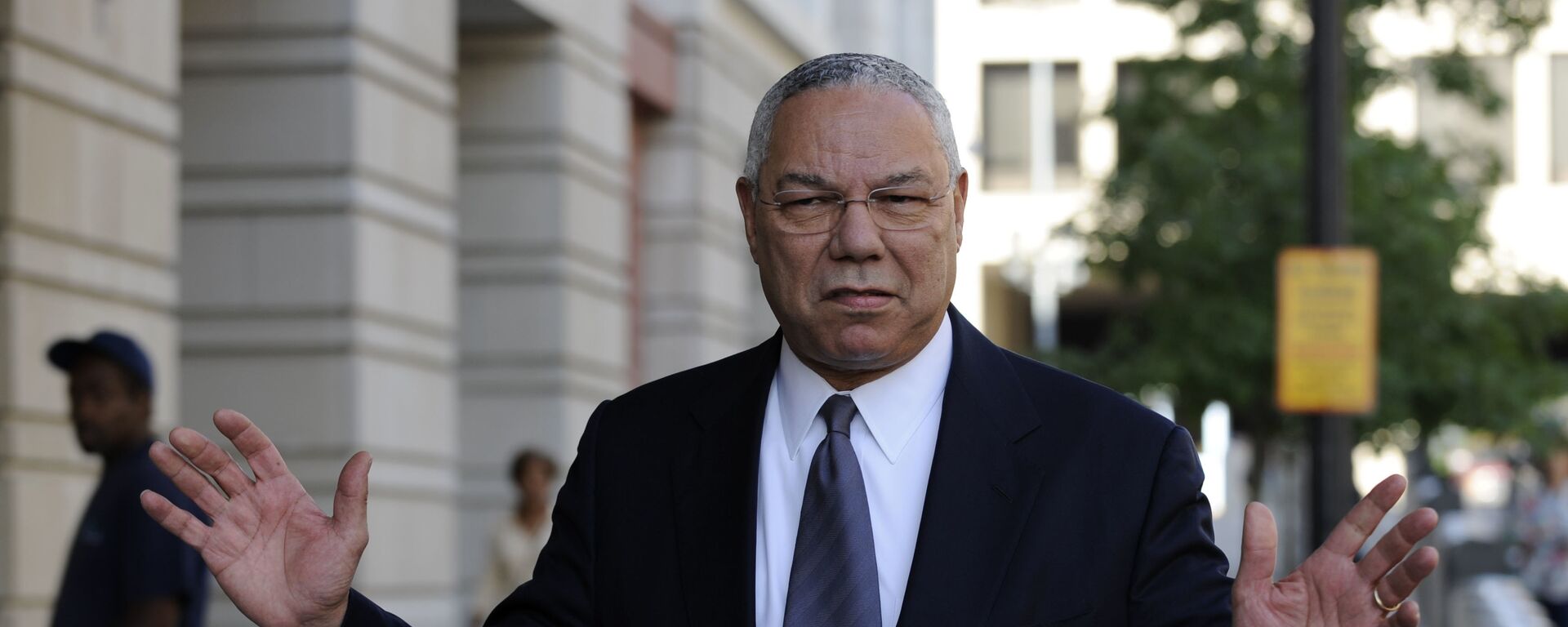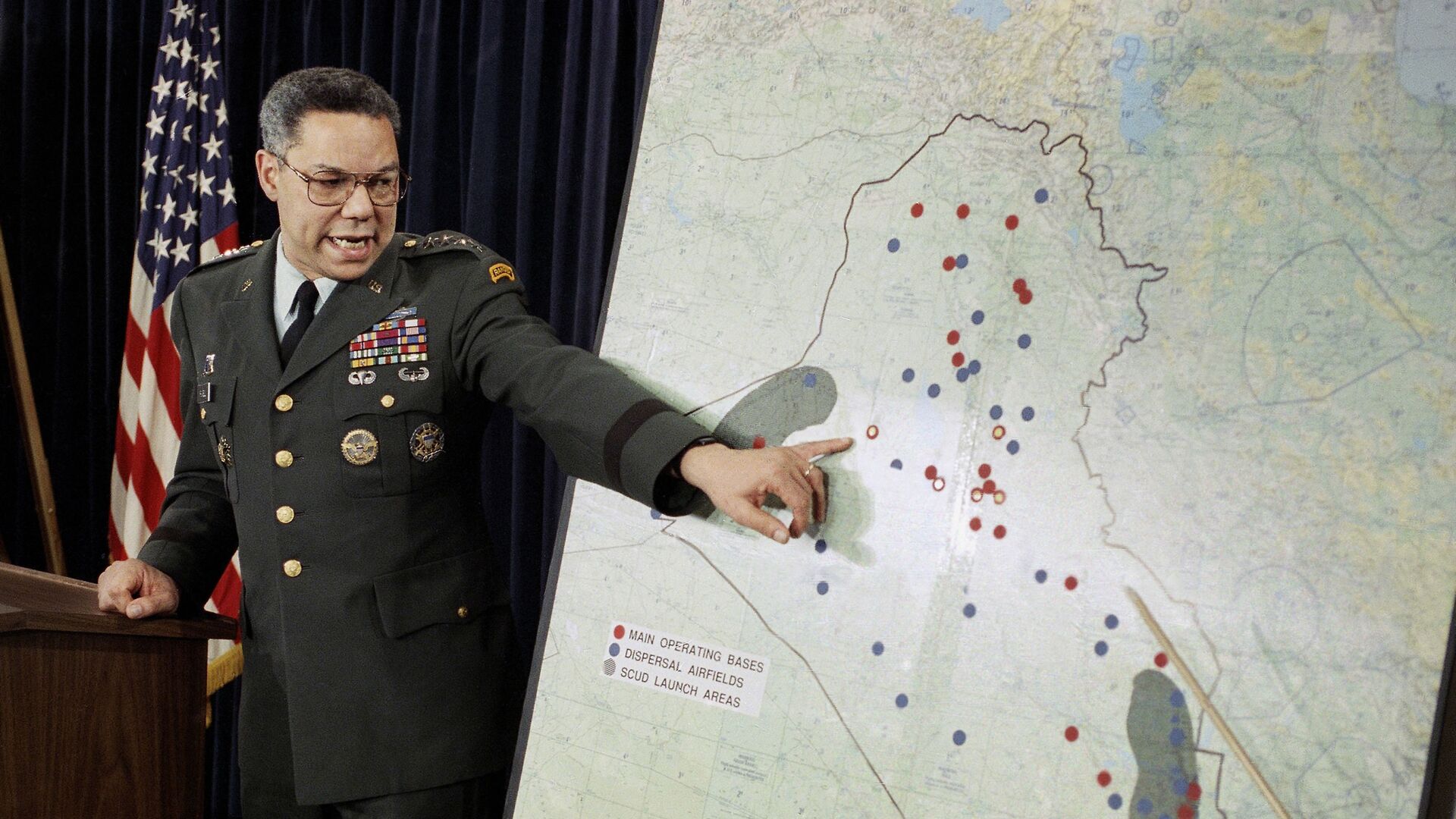https://sputnikglobe.com/20211019/imperial-stooge-colin-powell-lauded-as-trailblazer-1090035252.html
Imperial Stooge Colin Powell Lauded as Trailblazer
Imperial Stooge Colin Powell Lauded as Trailblazer
Sputnik International
Tributes were flowing for former US Secretary of State Colin Powell who died this week at the age of 84 from complications due to the Covid-19 disease. 19.10.2021, Sputnik International
2021-10-19T11:36+0000
2021-10-19T11:36+0000
2022-12-08T16:20+0000
columnists
colin powell
2003 invasion of iraq
iraq war
https://cdn1.img.sputnikglobe.com/img/07e5/0a/13/1090025761_0:0:2998:1686_1920x0_80_0_0_4168804034ef898ab934d0af1c606815.jpg
Even in death, he seems to have a knack for setting records. Powell is probably the most well known American public figure to have died so far from the pandemic.Current and former world leaders described him as a man of “immense integrity” noting his role model career as the first African-American to reach the highest office in the Pentagon.US President Joe Biden said of Powell that he embodied the “highest ideals of both warrior and diplomat”.Antony Blinken, the US Secretary of State, said Powell’s life was “a victory of the American Dream”.A headline on the BBC described him as a “trailblazer”.Colin Powell was born in 1937 in the New York City ghetto of Harlem. He was the child of Jamaican immigrants. On one hand, it could be said that his future stellar career as a military officer and politician involved a series of impressive achievements and “firsts”.He was a highly decorated veteran of the Vietnam War and rose to become a Four Star General. Then in 1987 he was made national security advisor to then President Ronald Reagan, the first African-American to hold such a senior position in the White House.In 1989, under President George Bush Snr, Powell was appointed as the Chairman of the Joint Chiefs of Staff – the highest military rank in the entire US armed forces. It was another “first” for people of color.More success was in store. In 2001, under President George Bush Jnr, the former military general was tapped to become Secretary of State to oversee US foreign policy.In many ways, therefore, Colin Powell paved the path for other black political figures like Condoleezza Rice who took over as Secretary of State and Barack Obama who became the first African-American president in 2008. The current head of the Pentagon Lloyd Austin this week also paid tribute to Powell for making his appointment as the first black Secretary of Defense possible.But there was a fiendish price to be paid for all these accolades and laurels. That price was duly called upon in 2003 in the run-up to the second Gulf War in Iraq.Powell was a key figure in making the case for that war even though years later he expressed remorse for his role. He harbored deep misgivings about the case for that war even at the time. However, the man of “immense integrity” was called on to shine the shoes for Uncle Sam, and he did so with impeccable elan.On February 5, 2003, the then Secretary of State addressed the United Nations Security Council to make the case for an impending war plan against Iraq. In a speech that later became infamous for its deception, Powell alarmed the council delegates by holding up a vial of white powder claiming that its biological warfare contents were part of Iraq’s weapons of mass destruction program. Powell intimated that if he dropped the vial everyone in the room would be killed. It was a macabre and deeply cynical showstopper which in itself arguably was a tacit act of terrorism to force world opinion to accept Washington’s writ for war.That speech was vital for launching the US war on Iraq the next month – a war that caused millions of deaths and a ruinous legacy for the wider Middle East. A war that was based on lies.It turned out within two years – and Powell admitted himself – that there were no WMDs in Iraq. He later in 2005 described his performance at the UN as a “blot on his career”. He said, “it was painful, it is painful now”.Powell may well have been riven with personal guilt, for he was responsible for unleashing a genocidal war, the destruction of the Iraqi nation, as well as ongoing repercussions for the wider region from terrorism and other conflicts. Powell’s court jester performance at the UN opened up a Pandora’s Box of US wars. But in his dutiful service for imperial power, he also unintentionally inflicted irreparable damage to American moral authority and international reputation.The poor black boy from Harlem may have been a trailblazer and role model of sorts. On a superficial level of US identity politics, yes, it could be said that Colin Powell embodied record gains for African-Americans.But the trail that he blazed most was in the service of US imperial wars. The tributes flowing for the late Colin Powell are actually a cause for shame, not eulogy. He was a stooge for US empire, an Uncle Tom figure who was allowed into the halls of power in order to lend a veneer of diversity and decency to an imperial war machine. A war machine that thinks nothing of destroying millions of brown-skinned people whenever that suits geopolitical interests.
https://sputnikglobe.com/20211018/colin-powell-dies-at-84-of-covid-complications--1090006764.html
Sputnik International
feedback@sputniknews.com
+74956456601
MIA „Rossiya Segodnya“
2021
Finian Cunningham
https://cdn1.img.sputnikglobe.com/img/07e5/01/0c/1081745381_0:429:2048:2477_100x100_80_0_0_02c0961b33c51d5d1a17db3237ef3811.jpg
Finian Cunningham
https://cdn1.img.sputnikglobe.com/img/07e5/01/0c/1081745381_0:429:2048:2477_100x100_80_0_0_02c0961b33c51d5d1a17db3237ef3811.jpg
News
en_EN
Sputnik International
feedback@sputniknews.com
+74956456601
MIA „Rossiya Segodnya“
Sputnik International
feedback@sputniknews.com
+74956456601
MIA „Rossiya Segodnya“
Finian Cunningham
https://cdn1.img.sputnikglobe.com/img/07e5/01/0c/1081745381_0:429:2048:2477_100x100_80_0_0_02c0961b33c51d5d1a17db3237ef3811.jpg
columnists, colin powell, 2003 invasion of iraq, iraq war
columnists, colin powell, 2003 invasion of iraq, iraq war
Imperial Stooge Colin Powell Lauded as Trailblazer
11:36 GMT 19.10.2021 (Updated: 16:20 GMT 08.12.2022) Tributes were flowing for former US Secretary of State Colin Powell who died this week at the age of 84 from complications due to the Covid-19 disease.
Even in death, he seems to have a knack for setting records. Powell is probably the most well known American public figure to have died so far from the pandemic.
Current and former world leaders
described him as a man of “immense integrity” noting his role model career as the first African-American to reach the highest office in the Pentagon.
US President Joe Biden said of Powell that he embodied the “highest ideals of both warrior and diplomat”.
Antony Blinken, the US Secretary of State, said Powell’s life was “a victory of the American Dream”.
A headline on the BBC described him as a “trailblazer”.

18 October 2021, 12:02 GMT
Colin Powell was born in 1937 in the New York City ghetto of Harlem. He was the child of Jamaican immigrants. On one hand, it could be said that his future stellar career as a military officer and politician involved a series of impressive achievements and “firsts”.
He was a highly decorated veteran of the Vietnam War and rose to become a Four Star General. Then in 1987 he was made national security advisor to then President Ronald Reagan, the first African-American to hold such a senior position in the White House.
In 1989, under President George Bush Snr, Powell was appointed as the Chairman of the Joint Chiefs of Staff – the highest military rank in the entire US armed forces. It was another “first” for people of color.
More success was in store. In 2001, under President George Bush Jnr, the former military general was tapped to become Secretary of State to oversee US foreign policy.
In many ways, therefore, Colin Powell paved the path for other black political figures like Condoleezza Rice who took over as Secretary of State and Barack Obama who became the first African-American president in 2008. The current head of the Pentagon Lloyd Austin this week also paid tribute to Powell for making his appointment as the first black Secretary of Defense possible.
But there was a fiendish price to be paid for all these accolades and laurels. That price was duly called upon in 2003 in the run-up to the second Gulf War in Iraq.
Powell was a key figure in making the case for that war even though years later he expressed remorse for his role. He harbored deep misgivings about the case for that war even at the time. However, the man of “immense integrity” was called on to shine the shoes for Uncle Sam, and he did so with impeccable elan.
On February 5, 2003, the then Secretary of State
addressed the United Nations Security Council to make the case for an impending war plan against Iraq. In a speech that later became infamous for its deception, Powell alarmed the council delegates by holding up a vial of white powder claiming that its biological warfare contents were part of Iraq’s weapons of mass destruction program. Powell intimated that if he dropped the vial everyone in the room would be killed. It was a macabre and deeply cynical showstopper which in itself arguably was a tacit act of terrorism to force world opinion to accept Washington’s writ for war.
That speech was vital for launching the US war on Iraq the next month – a war that caused millions of deaths and a ruinous legacy for the wider Middle East. A war that was based on lies.
It turned out within two years – and Powell admitted himself – that there were no WMDs in Iraq. He later in 2005
described his performance at the UN as a “blot on his career”. He said, “it was painful, it is painful now”.
Powell may well have been riven with personal guilt, for he was responsible for unleashing a genocidal war, the destruction of the Iraqi nation, as well as ongoing repercussions for the wider region from terrorism and other conflicts. Powell’s court jester performance at the UN opened up a Pandora’s Box of US wars. But in his dutiful service for imperial power, he also unintentionally inflicted irreparable damage to American moral authority and international reputation.
The poor black boy from Harlem may have been a trailblazer and role model of sorts. On a superficial level of US identity politics, yes, it could be said that Colin Powell embodied record gains for African-Americans.
But the trail that he blazed most was in the service of US imperial wars. The tributes flowing for the late Colin Powell are actually a cause for shame, not eulogy. He was a stooge for US empire, an Uncle Tom figure who was allowed into the halls of power in order to lend a veneer of diversity and decency to an imperial war machine. A war machine that thinks nothing of destroying millions of brown-skinned people whenever that suits geopolitical interests.

![FILE PHOTO: U.S. Secretary of State Colin Powell holds up a vial that he described as one that could contain anthrax, during his presentation on [Iraq] to the U.N. Security Council, in New York February 5, 2003. FILE PHOTO: U.S. Secretary of State Colin Powell holds up a vial that he described as one that could contain anthrax, during his presentation on [Iraq] to the U.N. Security Council, in New York February 5, 2003. - Sputnik International, 1920, 19.10.2021](https://cdn1.img.sputnikglobe.com/img/07e5/0a/13/1090025673_0:0:2200:1706_1920x0_80_0_0_5fcdf28b73d8172f7d199a0b79726960.jpg)


